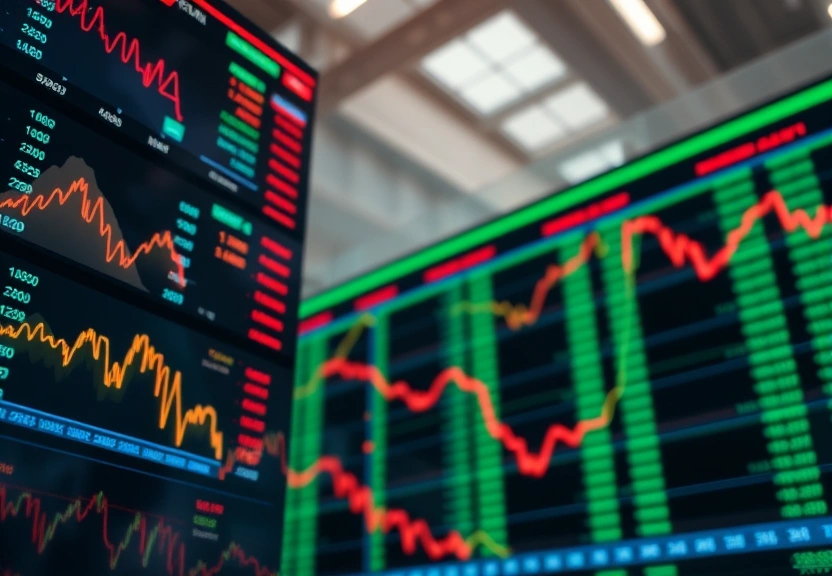Stocks and Bonds Plunge Together as Trade Tensions Rattle Investors
In a dramatic turn of events, U.S. stocks and government bonds experienced a significant selloff on Friday, driven by escalating trade tensions and President Trump’s recent threats of new tariffs. Investors are increasingly concerned about the potential impact of these tariffs on the broader economy, which has caused a ripple effect throughout financial markets. As both asset classes face downward pressure, it raises critical questions about the future trajectory of investment strategies in an environment marked by uncertainty.

As we delve into the implications of this selloff, it’s essential to understand the interconnectedness of stocks and bonds, how trade tensions influence market sentiment, and what investors can do to navigate these turbulent waters. This article aims to provide a comprehensive overview of the current market landscape, focusing on the interplay between trade tensions, tariffs, and investor behavior.
The Current State of Stocks and Bonds
On Friday, major U.S. stock indices, including the S&P 500 and the Dow Jones Industrial Average, saw significant declines, with many sectors experiencing sharp losses. Simultaneously, government bonds, traditionally seen as a safe haven during times of market volatility, also faced heavy selling pressure. This unusual correlation between stocks and bonds suggests a broader sentiment of fear and uncertainty among investors.
Understanding Market Reactions
Market reactions to trade tensions are often complex. When investors fear that tariffs will disrupt supply chains and increase costs for businesses, they may pull back from equities, leading to stock price declines. At the same time, bonds can fall in value as investors reassess their risk tolerance, leading to selling across asset classes. This synchronous selloff indicates a heightened level of anxiety regarding the economic outlook.
The Impact of Tariffs on Financial Markets
Tariffs, which are taxes imposed on imported goods, have a profound impact on both domestic and global trade. President Trump’s threats of new tariffs against various trade partners have raised concerns about a potential trade war, which could have far-reaching consequences for the economy and investors alike.
Sector Vulnerabilities
- Manufacturing: Companies reliant on imported materials may face increased costs, which could squeeze profit margins.
- Consumer Goods: Tariffs on imports could lead to higher prices for consumers, potentially dampening spending.
- Technology: The tech sector, often reliant on global supply chains, could see disruptions that affect production timelines.
Investor Sentiment Amid Trade Uncertainty
As trade tensions escalate, investor sentiment plays a crucial role in market movements. Fear and uncertainty can lead to panic selling, as investors rush to liquidate positions to avoid further losses. This behavior can create a self-reinforcing cycle of declines, where falling prices trigger additional selling pressure.
Behavioral Finance Insights
Behavioral finance suggests that investor reactions to news—especially negative news—are often exaggerated. In the case of trade tensions, the fear of the unknown can lead to overreactions in the market. Investors may want to consider the long-term implications of trade policies rather than reacting impulsively to short-term news cycles.
Strategies for Investors in a Volatile Market
In times of market volatility driven by trade tensions and tariffs, investors must adopt strategies to mitigate risk while seeking opportunities. Here are some practical strategies to consider:
- Diversification: Spread investments across various asset classes to reduce exposure to any single market segment.
- Defensive Stocks: Consider investing in sectors that tend to perform well during downturns, such as utilities and consumer staples.
- Fixed Income Investments: While bonds may be under pressure, certain fixed-income securities can provide stability in an uncertain environment.
- Stay Informed: Keep abreast of trade developments and economic indicators to make informed investment decisions.
- Long-Term Perspective: Focus on long-term goals rather than short-term fluctuations, remembering that markets tend to recover over time.
Frequently Asked Questions (FAQ)
1. What are tariffs, and how do they affect the economy?
Tariffs are taxes imposed on imported goods, which can increase the cost of those goods for consumers and businesses. This can lead to higher prices, reduced consumer spending, and potential disruptions in trade relationships.
2. Why did both stocks and bonds sell off simultaneously?
The simultaneous selloff indicates a broad sense of fear among investors. When trade tensions rise, both equities and bonds can decline as investors reassess their risk exposure across markets.
3. How can investors protect themselves during trade tensions?
Investors can protect themselves by diversifying their portfolios, focusing on defensive sectors, and maintaining a long-term investment perspective. Staying informed about market developments is also crucial.
4. What sectors are most vulnerable to trade tensions?
Sectors such as manufacturing, consumer goods, and technology are particularly vulnerable to trade tensions, as they often rely on global supply chains and may face increased costs due to tariffs.
5. Should investors panic during market selloffs?
Panic selling can lead to significant losses, especially if investors make impulsive decisions. It’s essential to stay calm, assess the situation, and consider long-term strategies rather than reacting to short-term market movements.
Conclusion
The recent plunge in both stocks and bonds highlights the intricate relationship between financial markets and trade tensions. As investors navigate this challenging landscape, understanding the implications of tariffs and geopolitical dynamics is crucial. By employing sound investment strategies and maintaining a long-term perspective, investors can better position themselves to weather the storm of uncertainty and emerge stronger on the other side. Market volatility may be unsettling, but it also presents opportunities for those who are prepared and informed.
📰 Original Source
Este artigo foi baseado em informações de: https://www.marketwatch.com/story/stocks-and-u-s-government-bonds-sell-off-in-tandem-friday-as-trade-jitters-cool-rally-95460259?mod=mw_rss_topstories


